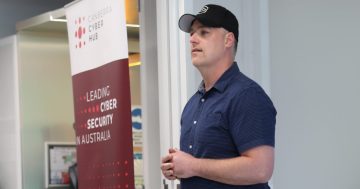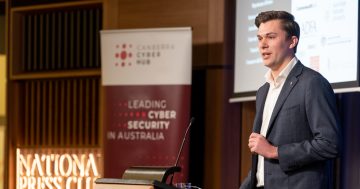
David Schmidtchen, a speaker at the Australian Cybersecurity Conference 2024. Photo: Hilary Wardhaugh.
Australia is headed for a cyber workforce shortage of 275,000 by 2030, but as industry, government, and higher education grapple with closing the gap, one expert says a double-edged sword has emerged.
In his presentation at the Australian Cyber Conference 2024, titled Skills, not jobs: building cyber workforce resilience is a journey, not a destination, Professor of Practice in Public Sector Management at UNSW Canberra David Schmidtchen will outline how the professionalisation of the cybersecurity industry is narrowing the talent pipeline, and will only exacerbate skill shortages.
He says shortages are not novel, but we have to better coordinate key players to address them.
“Cyber and AI have simply emerged as the latest iteration of workforce shortages,” he says.
“What I find is that we’re invariably good at describing the problem, but our solution to fixing it is not coordinated.
“We have government describing the problem, industry responding promptly to what they see as demand and the higher education sector adapting to keep pace with what’s going on.
“The trouble is, we’re now at a point where we can’t wait to fix the problem – it’s become too big. How do we get these players working better together?”
Addressing cyber workforce shortfalls goes beyond accounting.
Rather than filling X number of job vacancies, Professor Schmidtchen says stakeholders must look at how they can contribute to a framework that allows people to acquire skills to keep pace with evolving demand.
“The education sector, for example, is under pressure to adapt how it delivers education to upskill people. In higher education, we’re questioning more and more the idea that a degree that takes two to three years to complete will keep pace with technology,” he says.
“The vocational sector is moving towards empowering people to build short, sharp practical skillsets, with enough rigour in the base knowledge to ensure people are competent. This would be bolstered by short courses that upskill people in particular products. These ‘micro-credentials’ are a good way to stack knowledge.”
But keeping pace isn’t simply a case of looking at the workforce in terms of immediate need and demand but asking what a resilient workforce looks like. If not, the industry will always be behind the eight ball.
“A resilient workforce can respond to changes in the environment and adapt to what’s happening relatively quickly. The education system is part of that, but the industry’s response to demand and the government’s role in coordination through strategies they put in place are also important,” he says.
“It’s time for industry to ask – do we have the right leadership and workforce culture to support adaptation? Are we focused on the right skills – not just technological skills? Do we have processes to move and share talent quickly to adjust to demands? Can HR, IT and finance work together to assess, select and share talent in various areas as we find out what people we need? Have we got the governance systems right for managing this workforce in what we want it to do?”
The problem also contends with outdated systems, such as those we use to assess a professional’s suitability for a job, their education and capacity.
“Do we really understand how quickly a person can close a gap in their knowledge? And how quickly can we lift our workforce if we’re paying attention not to the gap, but to the systems around that gap – such as leadership, culture and processes?” Professor Schmidtchen asks.
“We also tend to take the traditional view that a career and how we educate people travel closely together. In other words, ‘I pursue knowledge to advance myself through that career’.
“In reality, your career may become more of a journey rather than trying to get to a particular place. You may want to embrace the idea that you learn by exposure to the job rather than credentialism through the education system.
“Increasingly universities and vocational education establishments are dealing with a different kind of student – not just kids out of school, but mature students re-skilling, giving life to that phrase ‘lifelong learning’.”
Skills, not jobs: building cyber workforce resilience is a journey, not a destination will be presented on Wednesday, 27 March, at 10:20 am as part of the Australian Cyber Conference at the National Convention Centre Canberra, from 25 to 27 March.
Original Article published by Dione David on Riotact.











